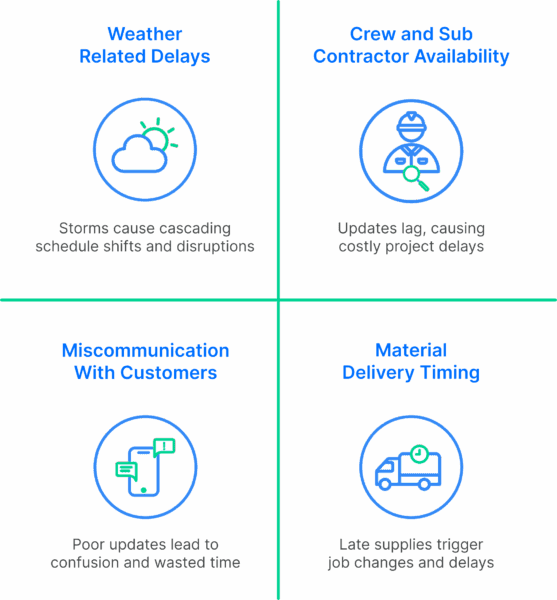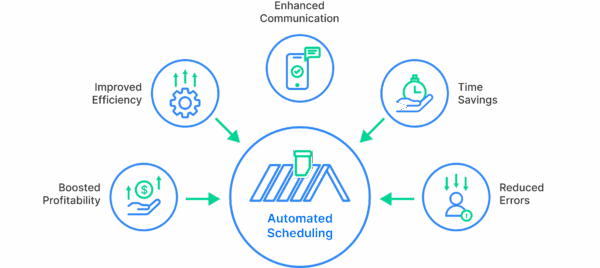
How much revenue is your roofing business losing to scheduling problems?
If you’re like most contractors, the answer is more than you realize. When weather delays ripple through your weekly schedule, when crews show up to the wrong job sites, or when customers cancel because they never received proper updates, you’re losing work and burning profit margins that took months to build.
87% of contractors report project delays, with weather and material issues topping the list. Meanwhile, construction teams waste nearly 14 hours per week per person simply managing scheduling mistakes and conflicts. That’s 14 hours of labor costs with zero productive output, multiplied across every person on your team.
In this blog, we’ll examine why scheduling remains such a persistent challenge for roofing contractors, explore how modern project management software like Arrivy addresses these specific pain points, and demonstrate the automation features that can transform chaotic calendars into coordinated operations.
Recommended Reads
Why Scheduling is a Major Challenge in Roofing Projects
Roofing projects operate in one of the most unpredictable environments in construction. While other trades might deal with some scheduling hiccups, roofers face a perfect storm of factors that can derail even the best-laid plans.
Weather-related delays
The weather is often the deciding factor in whether work can happen at all. Industry research shows that adverse weather delays about 45% of construction projects worldwide each year, and roofing bears the brunt of these disruptions. When you can’t work safely on a wet or icy roof, there’s no workaround.
What makes this especially challenging is the domino effect. A single storm pushes back your entire schedule. That Tuesday job becomes a Wednesday job, which bumps Wednesday’s project to Thursday, and suddenly your whole week looks different. In contractor surveys, 66% consistently cite weather as their top scheduling risk, making it clear this isn’t just a seasonal problem but a year-round concern.
Crew and subcontractor availability
The construction industry faces a significant labor shortage that directly impacts roofing scheduling. Current estimates suggest the U.S. needs approximately 723,000 new construction workers annually just to meet demand, with builders reporting skilled-trade shortages. For roofing contractors, this translates into constant balancing of crew assignments.
When your lead roofer calls in sick or your subcontractor gets pulled into an emergency repair, you’re potentially missing the specific person and skills needed for that particular job. This creates a cascading effect where you either delay the project or scramble to find qualified replacements, often at premium rates that eat into your margins.
Material delivery timing
Supply chain disruptions have become increasingly common, with 71% of contractors reporting that material and supply issues impact their schedules. For roofing projects, timing is everything. Shingles arriving a day late might mean your crew has to move to another job, creating a scheduling domino effect that takes days or even weeks to resolve.
The challenge becomes even more complex when you consider that different roofing materials have different lead times and delivery requirements. Coordinating all the moving parts manually leaves plenty of room for costly mistakes.
Miscommunication with customers
One of the most frustrating scheduling challenges comes from simple miscommunication. Studies estimate that poor information flow delays approximately 30% of construction projects, and roofing is particularly vulnerable because customers are often anxious about their home’s protection.
When customers don’t receive timely updates about schedule changes, they might take time off work unnecessarily or even hire another contractor, thinking you’ve abandoned the job. On the flip side, unclear communication about project timelines can lead to customers not being ready when your crew arrives, wasting valuable time and creating tension.

What is Roofing Project Management Software?
Think of roofing project management software as a specialized platform designed specifically for the challenges that roofing contractors face. It understands that your needs go far beyond simple task lists and calendars.
At its core, this software brings together all the moving parts of your roofing operation into one coordinated system. Instead of managing separate tools for scheduling, customer communication, crew coordination, and job tracking, you get everything in one place.
What makes roofing project management software different from generic tools is its deep understanding of field service operations. It knows that your crews work on location, that weather can shut down jobs instantly, that customers need real-time updates about service appointments, and that routing efficiency can make or break your daily profitability. These platforms are built around the realities of roofing projects and the constant need to coordinate between office staff and field crews.
Modern roofing project management platforms also recognize that today’s customers expect the same level of service transparency they get from ride-sharing apps or food delivery services. They want to know when you’re coming, where you are, and what’s happening with their project. The software makes that level of communication possible without overwhelming your team with manual updates.
How Roofing Project Management Software Automates Scheduling
The real payoff comes when you see how modern software transforms scheduling into a smooth, automated process. Let’s walk through how these systems actually work in practice.
Smart scheduling with drag-and-drop tools
Imagine having a visual calendar where you can see all your jobs, crews, and resources at a glance. Arrivy’s drag-and-drop interface lets you build schedules by simply moving jobs around a color-coded calendar. Need to reassign a crew because your lead roofer is sick? Just drag that job to a different crew’s timeline. Want to see who’s available next Tuesday? Filter the view to show only available technicians and their skillsets.
This visual approach makes scheduling intuitive. You can quickly spot conflicts, balance workloads across crews, and ensure that your most skilled technicians are assigned to the most complex jobs. The system tracks crew availability, current locations, and skillsets so you avoid assigning someone who’s hundreds of miles away for an urgent morning repair.
Automated rescheduling when jobs shift
Here’s where automation really shines. When the inevitable happens (weather delays, customer cancellations, or material shortages), the software doesn’t just let you manually rebuild your schedule. Arrivy’s automated assignment logic can instantly suggest the best alternatives based on crew availability, proximity, and skill requirements.
Say a storm cancels your Tuesday morning job. Instead of spending 30 minutes on the phone figuring out what to do next, the system identifies which crews are available, which jobs could be moved up, and what an optimal revised schedule looks like. It can account for travel time between locations and automatically update everyone affected by the changes.
The software also handles recurring jobs and workflow automation. If you’re managing a multi-phase roofing project, completing one stage (such as an inspection) can trigger scheduling for the next phase, send out the appropriate notifications, and help ensure required materials or permits are in place.
Real-time updates across crews and customers
One of the biggest time-savers is eliminating the constant phone tag for schedule changes. When Arrivy makes an adjustment, everyone is updated instantly. Crews receive push notifications on their mobile apps, customers get SMS or email alerts with new appointment times and live ETAs, and office staff see changes reflected across connected systems.
Route optimization for field crews
Arrivy’s multi-stop route optimization considers traffic, job priorities, and crew capabilities to create efficient daily routes. The system can automatically reorder a crew’s stops to minimize driving time and travel distance, which increases billable hours and reduces fuel and overtime costs.
If an emergency call comes in, the software can determine which crew is closest and best equipped, then adjust everyone’s routes to keep the day efficient. For roofing contractors, that can mean fitting an additional job into the day or avoiding costly overtime.
Calendar syncing
Integration with personal and team calendars keeps scheduling from getting trapped in one system. When you book a job in Arrivy, it can appear on your team’s calendars (for example, via Google Calendar sync and other calendar connectors), preventing double-bookings and reducing missed appointments.
The calendar connection also respects blocked time. If a team member marks vacation or training on their personal calendar, the scheduling system will avoid assigning them jobs during those periods. This smooth sync reduces conflicts and improves coordination.
Key Benefits of Automating Scheduling in Roofing Projects
Now that you understand how automated scheduling works, let’s explore the concrete benefits you’ll see in your roofing operation. These advantages translate directly into time savings, reduced stress, and improved profitability.
Reduce errors and double-bookings
Automated scheduling systems enforce business rules that prevent common errors like double-booking crews or scheduling someone for a job they’re not qualified to handle.
Arrivy’s conflict-checking features highlight potential problems before they become real issues. If you try to schedule a crew that’s already committed elsewhere, the system immediately flags the conflict and suggests alternatives. This prevents the embarrassing situation of showing up at a customer’s house only to discover another crew is supposed to be there too.
The system also maintains a complete audit trail, so you can see exactly when changes were made and why. This visibility helps resolve disputes and provides accountability across your team.
Improve crew utilization and efficiency
Optimized scheduling means your crews spend more time working and less time sitting idle or driving between jobs. When the software automatically factors in travel time, skill requirements, and job priorities, you get schedules that maximize productive hours.
Route optimization alone can dramatically impact your bottom line. Instead of each crew planning their own routes (which often aren’t optimal), the system calculates the most efficient path through their daily assignments. This typically results in less driving time, which translates directly into either more jobs per day or crews getting home earlier.
The mobile access also improves field efficiency. Instead of calling the office for job details or updates, crews can access everything they need right from their phones. This eliminates delays and keeps projects moving smoothly.
Enhance customer communication with real-time updates
Today’s customers expect transparency. They want to know when you’re coming, if you’re running late, and what’s happening right now. Automated communication features make this level of service possible without overwhelming your office staff.
Arrivy automatically sends booking confirmations, appointment reminders, and “on the way” notifications. Customers can track their service team’s location in real-time. This proactive communication reduces anxiety and the number of “where are you?” calls your office receives.
The system can also automatically collect feedback after job completion, helping you maintain high service standards and generate positive reviews without manual follow-up work.
Save time for project managers and dispatchers
Industry research shows that project managers currently spend about 90% of their time on communication-related tasks. Automated scheduling and communication features can dramatically reduce this administrative burden, freeing up your most experienced people to focus on business development and strategic planning.
Instead of spending the first hour of each day making phone calls to coordinate schedules, your dispatchers can focus on optimizing routes, handling emergency calls, and ensuring crews have everything they need to succeed. This shift improves overall operations and reduces stress.
Boost profitability by keeping projects on track
The financial impact of better scheduling extends beyond simple efficiency gains. When you can minimize delays, reduce rework caused by miscommunication, and maximize crew utilization, every aspect of your operation becomes more profitable. Better scheduling also improves customer satisfaction, leading to more referrals and repeat business.

The Data is Compelling
Firms that implement proper project coordination can dramatically reduce the inefficiencies that currently waste billions in construction labor costs annually. For roofing contractors, this translates into healthier margins and sustainable growth. (Source)
The Best Roofing Project Management Software for Scheduling
When it comes to comprehensive scheduling automation specifically designed for roofing contractors, Arrivy stands out as a solution that addresses the real-world challenges we’ve discussed throughout this blog. Rather than offering a generic project management tool, Arrivy was built from the ground up to handle the exact demands of field service operations.
Scheduling Made Simple
What makes Arrivy particularly effective for roofing scheduling is its visual drag-and-drop interface combined with intelligent automation. You can easily build multi-resource calendars that show crew availability, skills, and current assignments at a glance. The color-coding and filtering options make it simple to spot conflicts or identify the best crew for a specific job. When changes inevitably happen, the automated assignment logic can instantly match available technicians based on their location, skills, and current workload.
Route Optimization
The platform excels at handling the dynamic nature of roofing work. Its AI-driven route optimization is traffic-aware and can instantly adapt when plans change. If an emergency call comes in, Arrivy can automatically recalculate optimal routes for all affected crews and update everyone in real-time.
Customer Experience that Feels Modern
“Customers receive personalized SMS and email notifications, and enjoy an Uber-like experience tracking your crew’s location in real time.”
Customer communication is where Arrivy really shines in the roofing context. The platform automatically handles the entire communication workflow, from initial booking confirmations to completion follow-ups. Customers receive personalized SMS and email notifications that are completely customizable and white-labeled with your branding.
Integrations That Save Time
The integration capabilities address one of the biggest pain points for growing roofing contractors. Arrivy connects seamlessly with over 50 business systems, including major CRMs like HubSpot, Salesforce, and Pipedrive, as well as accounting platforms like QuickBooks and Xero. Many of these integrations work bidirectionally, meaning changes in your CRM automatically update Arrivy schedules, and completed jobs in Arrivy can trigger invoice creation in your accounting system.
Empowering Crews in the Field
For roofing crews working in the field, Arrivy’s mobile app provides everything they need without complexity. Technicians can view their daily schedules, access detailed job information, capture photos and signatures, and communicate with both dispatch and customers, all from their phones. The offline capability ensures they can continue working even in areas with poor cellular coverage, with all data syncing automatically once they’re back online.
Full Visibility for Dispatchers
The real-time GPS tracking gives dispatchers complete visibility into crew locations and job status, which is especially important for managing multiple roofing projects. When customers call asking for updates, your office staff can provide accurate information without having to interrupt crews or make phone calls.
Workflow Automation at Scale
Perhaps most importantly for roofing contractors, Arrivy handles the workflow automation that can transform your business operations. Recurring maintenance contracts, multi-phase roofing projects, and follow-up inspections can all be automated with custom triggers. This means less manual scheduling work for your team and fewer opportunities for important tasks to get delayed or forgotten.
Key Outcomes Roofing Contractors See with Arrivy:
- Eliminate scheduling conflicts and double-bookings
- Cut travel waste with real-time routing
- Boost customer satisfaction with live tracking
- Automate billing and follow-ups for faster cash flow
Summing Up
The challenges of scheduling roofing projects aren’t going away anytime soon. Meanwhile, customer expectations for transparency and professional service continue to rise, while labor shortages and supply chain disruptions create even more complexity.
However, the solution isn’t to work harder at managing these challenges manually. The roofing industry’s rapid adoption of digital tools, with 65% of contractors increasing their technology use, shows that successful businesses are choosing to work smarter instead.
The companies that employ roofing project management software are now positioning themselves for sustainable growth in an increasingly competitive market. They’re providing better customer experiences, operating more efficiently, and building the kind of systematic approach to business that allows them to scale without losing quality.
